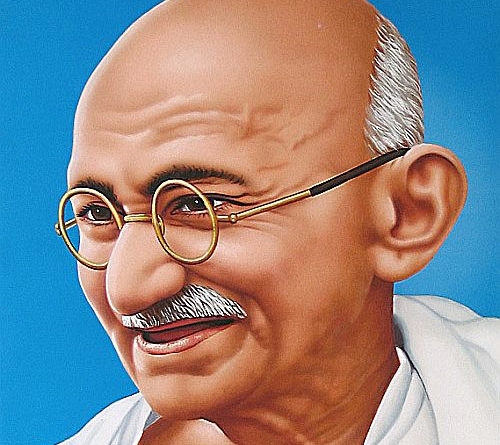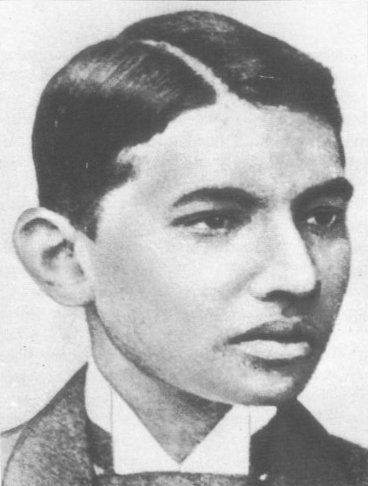MAHATMA GANDHI
MAHATMA GANDHI
 Gandhi's
vision of an independent India based on religious pluralism,
however, was challenged in the early 1940s by a new Muslim nationalism which
was demanding a separate Muslim homeland carved out of India. Eventually,
in August 1947, Britain granted independence, but the British Indian Empire was partitioned into
two dominions, a Hindu-majority India and Muslim-majority Pakistan. As many
displaced Hindus, Muslims, and Sikhs made their way to their new lands,
religious violence broke out, especially in the Punjab and Bengal. Eschewing the official celebration of independence in
Delhi, Gandhi visited the affected areas, attempting to provide solace. In the
months following, he undertook several fasts unto death to stop religious violence. The last of
these, undertaken on 12 January 1948 when he was 78, also had the indirect goal
of pressuring India to pay out some cash assets owed to Pakistan.[ Some
Indians thought Gandhi was too accommodating. Among them was Nathuram Godse, a Hindu nationalist, who assassinated Gandhi on
30 January 1948 by firing three bullets into his chest. Gandhi's birthday, 2
October, is commemorated in India as Gandhi Jayanti, a national holiday, and
worldwide as the International Day of
Nonviolence.
Gandhi's
vision of an independent India based on religious pluralism,
however, was challenged in the early 1940s by a new Muslim nationalism which
was demanding a separate Muslim homeland carved out of India. Eventually,
in August 1947, Britain granted independence, but the British Indian Empire was partitioned into
two dominions, a Hindu-majority India and Muslim-majority Pakistan. As many
displaced Hindus, Muslims, and Sikhs made their way to their new lands,
religious violence broke out, especially in the Punjab and Bengal. Eschewing the official celebration of independence in
Delhi, Gandhi visited the affected areas, attempting to provide solace. In the
months following, he undertook several fasts unto death to stop religious violence. The last of
these, undertaken on 12 January 1948 when he was 78, also had the indirect goal
of pressuring India to pay out some cash assets owed to Pakistan.[ Some
Indians thought Gandhi was too accommodating. Among them was Nathuram Godse, a Hindu nationalist, who assassinated Gandhi on
30 January 1948 by firing three bullets into his chest. Gandhi's birthday, 2
October, is commemorated in India as Gandhi Jayanti, a national holiday, and
worldwide as the International Day of
Nonviolence.

Mohandas Karamchand Gandhi :- October 1869 – 30 January 1948) was the
leader of the Indian independence movement against British rule. Employing nonviolent civil disobedience, Gandhi
led India to independence and inspired movements for civil rights and freedom
across the world. The applied to him first in 1914 in South Africa is now used
worldwide. In India, he is also called Bapu ji (Gujarati: endearment for father , papa
and Gandhi ji. He is
unofficially called the Father of the Nation.
Born and raised in a Hindu merchant caste family in coastal Gujarat, western India, and trained in law at the Inner Temple, London, Gandhi first employed nonviolent civil
disobedience as an expatriate lawyer in South Africa, in the resident Indian
community's struggle for civil rights. After his return to India in 1915, he
set about organising peasants, farmers, and urban labourers to protest against
excessive land-tax and discrimination. Assuming leadership of the Indian National Congress in
1921, Gandhi led nationwide campaigns for various social causes and for
achieving Swaraj or self-rule.Gandhi famously led Indians in
challenging the British-imposed salt tax with the 400 km
(250 mi) Dandi Salt March in 1930, and later
in calling for the British to Quit India in
1942. He was imprisoned for many years, upon many occasions, in both South
Africa and India. He lived modestly in a self-sufficient residential community and wore the
traditional Indian dhoti and
shawl, woven with yarn hand-spun on a charkha. He ate
simple vegetarian food, and also undertook long
fasts as a means of both self-purification and political
protest.
 Gandhi's
vision of an independent India based on religious pluralism,
however, was challenged in the early 1940s by a new Muslim nationalism which
was demanding a separate Muslim homeland carved out of India. Eventually,
in August 1947, Britain granted independence, but the British Indian Empire was partitioned into
two dominions, a Hindu-majority India and Muslim-majority Pakistan. As many
displaced Hindus, Muslims, and Sikhs made their way to their new lands,
religious violence broke out, especially in the Punjab and Bengal. Eschewing the official celebration of independence in
Delhi, Gandhi visited the affected areas, attempting to provide solace. In the
months following, he undertook several fasts unto death to stop religious violence. The last of
these, undertaken on 12 January 1948 when he was 78, also had the indirect goal
of pressuring India to pay out some cash assets owed to Pakistan.[ Some
Indians thought Gandhi was too accommodating. Among them was Nathuram Godse, a Hindu nationalist, who assassinated Gandhi on
30 January 1948 by firing three bullets into his chest. Gandhi's birthday, 2
October, is commemorated in India as Gandhi Jayanti, a national holiday, and
worldwide as the International Day of
Nonviolence.
Gandhi's
vision of an independent India based on religious pluralism,
however, was challenged in the early 1940s by a new Muslim nationalism which
was demanding a separate Muslim homeland carved out of India. Eventually,
in August 1947, Britain granted independence, but the British Indian Empire was partitioned into
two dominions, a Hindu-majority India and Muslim-majority Pakistan. As many
displaced Hindus, Muslims, and Sikhs made their way to their new lands,
religious violence broke out, especially in the Punjab and Bengal. Eschewing the official celebration of independence in
Delhi, Gandhi visited the affected areas, attempting to provide solace. In the
months following, he undertook several fasts unto death to stop religious violence. The last of
these, undertaken on 12 January 1948 when he was 78, also had the indirect goal
of pressuring India to pay out some cash assets owed to Pakistan.[ Some
Indians thought Gandhi was too accommodating. Among them was Nathuram Godse, a Hindu nationalist, who assassinated Gandhi on
30 January 1948 by firing three bullets into his chest. Gandhi's birthday, 2
October, is commemorated in India as Gandhi Jayanti, a national holiday, and
worldwide as the International Day of
Nonviolence.
Gandhi came
from a poor family, and he had dropped out of the cheapest college he could
afford. Mavji Dave Joshiji, a Brahmin priest and family friend, advised Gandhi and his
family that he should consider law studies in London. In July 1888, his wife
Kasturba gave birth to their first surviving son, Harilal. His mother was
not comfortable about Gandhi leaving his wife and family, and going so far from
home. Gandhi's uncle Tulsidas also tried to dissuade his nephew. Gandhi wanted
to go. To persuade his wife and mother, Gandhi made a vow in front of his
mother that he would abstain from meat, alcohol and women. Gandhi's brother
Laxmidas, who was already a lawyer, cheered Gandhi's London studies plan and
offered to support him. Putlibai gave Gandhi her permission and blessing.
On 10 August
1888, Gandhi aged 18, left Porbandar for Bombay (Mumbai). Upon arrival, he
stayed with the local Modh Bania community while waiting for the ship travel
arrangements. The head of the community knew Gandhi's father. After learning
Gandhi's plans, he and other elders warned Gandhi that England would tempt him
to compromise his religion, and eat and drink in Western ways. Gandhi informed
them of his promise to his mother and her blessings. The local chief
disregarded it, and excommunicated him an outcast. But Gandhi ignored this, and
on 4 September, he sailed from Bombay to London. His brother saw him off.

In London,
Gandhi studied law and jurisprudence and enrolled at the Inner Temple with the intention of becoming a barrister. His childhood shyness and self withdrawal had continued
through his teens, and he remained so when he arrived in London, but he joined
a public speaking practice group and overcame this handicap to practise law.His time in London
was influenced by the vow he had made to his mother. He tried to adopt
"English" customs, including taking dancing lessons. However, he
could not appreciate the bland vegetarian food offered by his landlady and was
frequently hungry until he found one of London's few vegetarian restaurants.
Influenced by Henry Salt'swriting, he
joined the Vegetarian Society, was
elected to its executive committee, and started a local Bayswater chapter. Some of the vegetarians he met were members of
the Theosophical Society,
which had been founded in 1875 to further universal brotherhood, and which was
devoted to the study of Buddhist and Hindu literature.
They encouraged Gandhi to join them in reading the Bhagavad Gita both in
translation as well as in the original.
Comments
Post a Comment